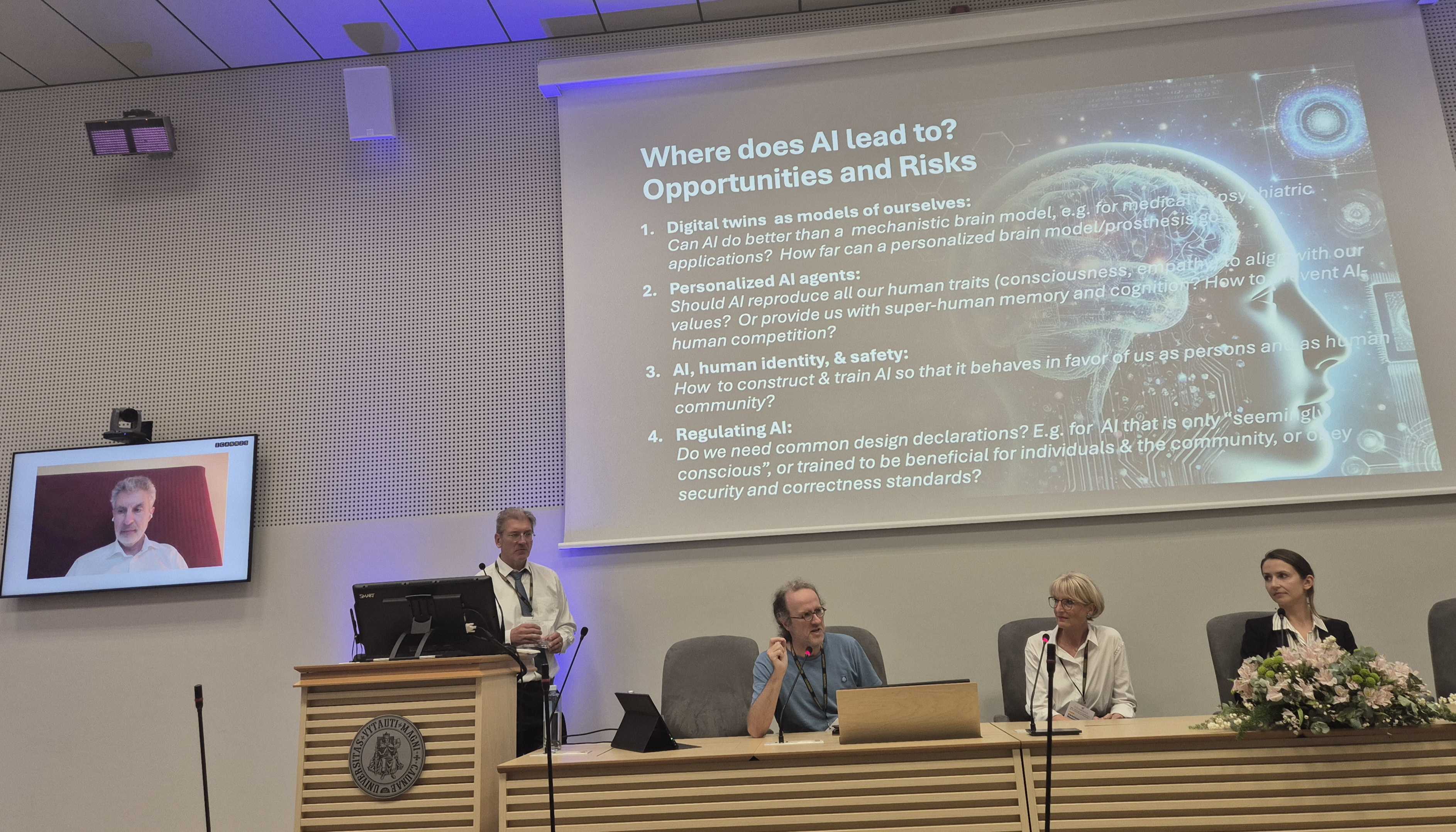VMU Hosted 34th International Conference on Artificial Neural Networks

On September 9–12, 2025 Kaunas hosted the 34th International Conference on Artificial Neural Networks (ICANN 2025) – a major international event in artificial intelligence and neuroscience. Since 1992, ICANN has grown into one of Europe’s most important conferences in the fields of artificial intelligence, deep neural networks, neuroscience, and neurotechnologies.
The conference was organized by the European Neural Network Society (ENNS) in cooperation with EBRAINS – European Brain Research Infrastructures, Vytautas Magnus University (VMU), and the Lithuanian University of Health Sciences (LSMU).
This year, the conference was chaired by two world-renowned experts in AI and neuroscience. Prof. Yoshua Bengio (Université de Montréal, Canada) – a pioneer of deep learning, recipient of the 2018 A. M. Turing Award, known as the “Nobel Prize of Computing.” Prof. Viktor Jirsa (Aix-Marseille University, France; EBRAINS Chief Science Officer) – a leading figure in theoretical neuroscience and creator of The Virtual Brain, an EBRAINS methodology widely used for building personalized digital brain models. EBRAINS is Europe’s neuroscience research infrastructure designed to advance international cutting-edge research in fundamental neuroscience, medicine, and artificial intelligence.
The conference was opened by VMU Rector Prof. Juozas Augutis, LSMU Rector Prof. Rimantas Benetis, Director of the LSMU Neuroscience Institute Prof. Arimantas Tamašauskas, ENNS President Prof. Stefan Wermter (University of Hamburg, Germany), and EBRAINS Chief Science Officer Prof. Viktor Jirsa (Aix-Marseille University, France).
Plenary talks addressed breakthroughs in AI and neuroscience research, the use of virtual brain twins in medicine, ethics, and the impact of technology on human identity. Presentations were delivered by Prof. Viktor Jirsa (Aix-Marseille University, France), Dr. Emmanuel Bengio (McGill University / Recursion/Valence Labs, Montréal, Canada), Prof. Christiane Woopen (University of Bonn, Germany), Prof. Bernhard Schölkopf (Max Planck Institute for Intelligent Systems, Tübingen, Germany), Dr. Gintarė Karolina Džiugaitė (DeepMind, USA), and Prof. Alessio Micheli (University of Pisa, Italy). Topics at the intersection of neuroscience and AI – including links between memory processes in the brain and deep neural networks, mathematical models of brain activity and their medical applications, and the development of trustworthy AI systems – were presented by invited speakers Dr. Mihai Petrovici (University of Bern, Switzerland), Prof. Mehmet Fatih Yanik (ETH Zurich, Switzerland), Michael Deistler (University of Tübingen, Germany), Dr. Ameya Pandurang Prabh (Tübingen AI Center, Germany), and Dr. Ignas Budvytis (Resilient Robotics, Cambridge, UK).
One of the highlights of the conference was the public panel discussion “Where Does AI Lead To? Opportunities and Risks,” featuring leading global experts Prof. Yoshua Bengio, Prof. Viktor Jirsa, Prof.
Christiane Woopen, Dr. Gintarė Karolina Džiugaitė, and Prof. Bernhard Schölkopf. The panel explored ethical dilemmas in AI, questions of human identity, the interaction between neuroscience and AI systems, and perspectives for safe and responsible AI development.
The conference also featured an extensive program of parallel sessions and tutorials covering diverse topics in AI and neuroscience: foundations and advances in artificial neural network architectures, the reliability of AI systems, neuromorphic systems, applications of deep neural networks in drug discovery, and methodologies for constructing virtual brain models applied to the diagnosis of brain diseases and personalized treatment planning.
ICANN 2025 received 375 research paper submissions, of which 170 were accepted, and 42 workshop and special session submissions, of which 29 were selected.
Conference proceedings were published in Artificial Neural Networks and Machine Learning – ICANN 2025 (Editors: Walter Senn, Marcello Sanguineti, Aušra Saudargienė, Igor V. Tetko, Alessandro E. P. Villa, Viktor Jirsa, Yoshua Bengio). Springer, 2025.
The ICANN 2025 Organizing and Program Committee brought together a strong international team of AI and neuroscience experts. Prof. Aušra Saudargienė (Vytautas Magnus University; Lithuanian University of Health Sciences) and Assoc. Prof. Linas Petkevičius (Vilnius University; President of the Lithuanian Artificial Intelligence Association) were leading the local organization team. The committee also included distinguished international scholars: Prof. Walter Senn (University of Bern, Switzerland), Prof. Igor Tetko (Helmholtz Munich, Germany), Prof. Alessandro Villa (University of Lausanne, Switzerland), and Prof. Marcello Sanguineti (University of Genoa, Italy).
The conference also marked the continuation of joint initiatives by Kaunas University of Technology (KTU), VMU, and LSMU in the fields of neuroscience and AI, including the establishment of EBRAINS National Node Lithuania. ICANN 2025 strengthened VMU’s visibility in Lithuania, Europe, and globally.
The conference has received funding from the Research Council of Lithuania (LMTLT), agreement No P-MOR-25-22-VDU, and has been performed in a cooperation with European Brain Research InfrastructureS (EBRAINS) and the European Neural Network Society (ENNS).
















